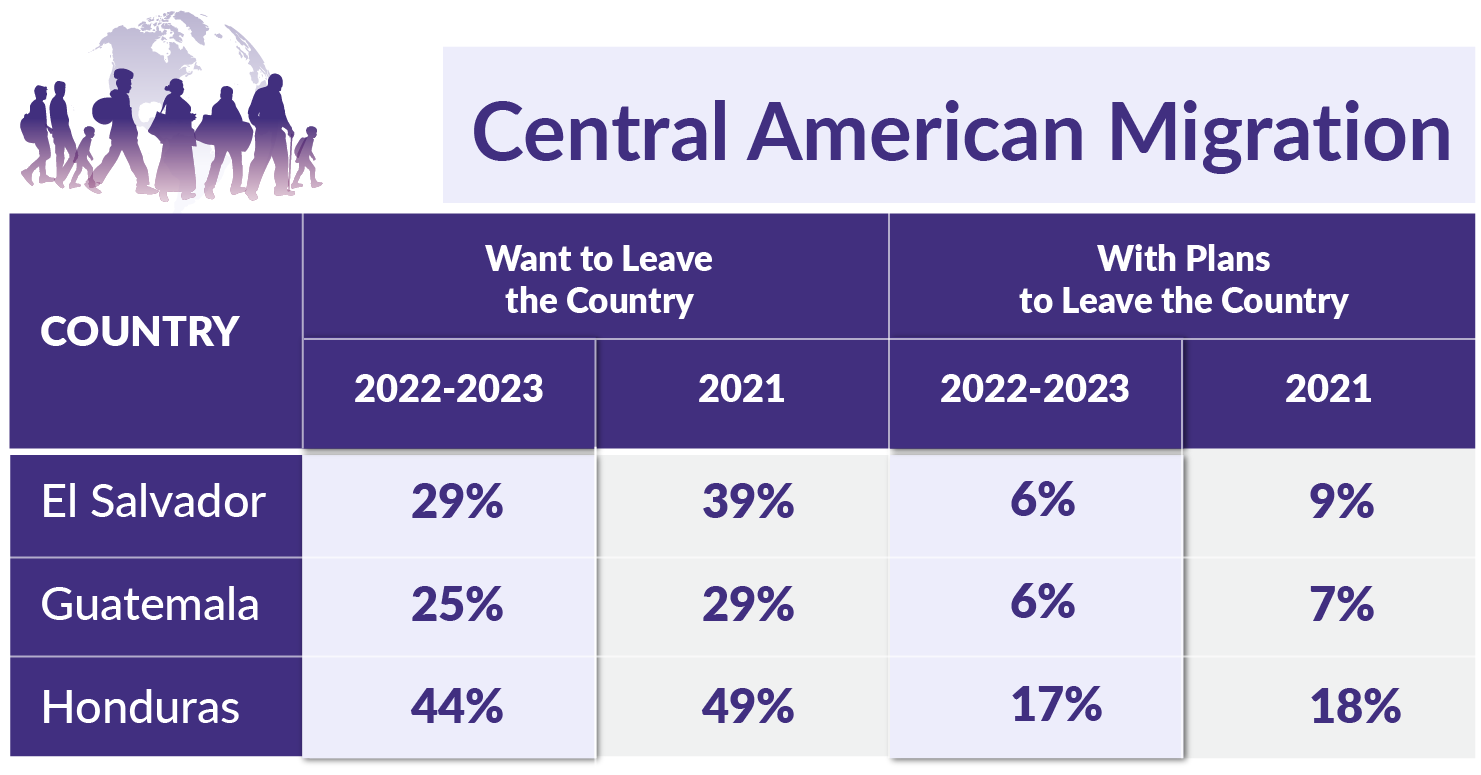

Photo Credit: Photo Beto
FOR IMMEDIATE RELEASE
MEDIA CONTACT: [email protected]
Surveys of Central Americans Highlight Rule of Law Drivers of Migration
One-Third of People in Central America’s Northern Triangle Wish to Leave
WASHINGTON May 9, 2023 – About a third of people in the Northern Triangle (El Salvador, Guatemala, and Honduras), on average, would like to migrate internationally according to new research from the World Justice Project. Hondurans express the strongest desire to migrate, with 44% saying they would like to leave the country.
The proportion of people wishing to migrate has dropped in all three countries since 2021, although the percentage of people who already have a plan to migrate has stayed relatively stable, at an average of about 10%. The new data comes from a series of nationally representative household polls conducted in the three countries within the last year, updating an earlier 2021 study.
The top reasons for wanting to leave the country varied. Most people cited better opportunities, family reasons, and a desire to live somewhere with less violence, corruption, or harassment.
“People don’t usually make the choice to leave their country without compelling reasons, so it is imperative to look to the root causes driving migration when considering policy responses,” said Elizabeth Andersen, executive director of the World Justice Project.
“When it comes to rule of law, countries in the Northern Triangle have long been among the poorest performers in the Western Hemisphere,” she added. “Insecurity, corruption, and weak justice systems can result in devastating consequences for individuals as well as undermine a community’s capacity to foster economic opportunity and peace. This new data shows some pockets of meaningful improvement over the past year, but the rule of law challenges in the region remain immense and are an important push factor behind migration.”
The following table shows how the desire to migrate internationally has changed since 2021.

Migration to the United States
The United States remains the top international destination of choice for those wishing to migrate from Northern Triangle countries. More than 10% of those surveyed, on average, said they previously attempted to migrate to the U.S. Hondurans represented the highest percentage with 16% of people reporting they had previously attempted to enter the U.S., 12% of Salvadorans previously attempted the journey, and 9% of Guatemalans. Most attempted their migration journeys alone.
World Justice Project data shows that people from the Northern Triangle who attempted to enter the U.S. were more likely to travel on foot (El Salvador 49%, Honduras 38%, and Guatemala 28%), leaving them susceptible to victimization along their travel route. About 30% of people from El Salvador, Guatemala, and Honduras reported that they had to pay a bribe along their journey to the U.S. and roughly 15% were subjected to violence or abuse. Most were victimized while in Mexico.
The World Justice Project will release the findings in its series of Rule of Law reports for 26 Latin American and Caribbean countries on May 17, 2023. The reports expand upon data contained in the 2022 WJP Rule of Law Index, which measures the rule of law in 140 countries and jurisdictions around the world. The Index relies on nationally representative household polls and expert surveys.
The new Latin American and Caribbean country reports contain additional insights regarding a variety of rule of law themes that are drawn from the household polls including accountability, authoritarianism, fundamental freedoms, crime victimization, criminal justice, and other topics. The reports also give a country-by-country view of rule of law trends over time.
Explore all the key rule of law findings for El Salvador, Guatemala, and Honduras in the country reports.






